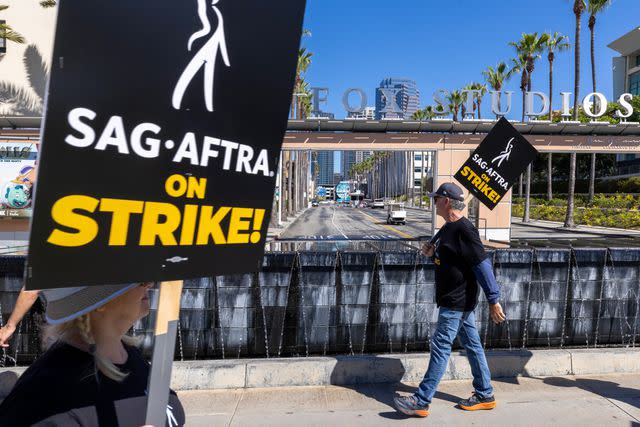The actors' strike is finally over — here's what's in the new SAG-AFTRA contract
The deal with the Alliance of Motion Picture and Television Producers secured big wins for actors, including higher wages, streaming bonuses, and protections on artificial intelligence.
After 118 days, the Hollywood actors' strike has officially concluded — and now we have a better idea of what the members of SAG-AFTRA have won in the union's new minimum contract agreement.
The SAG-AFTRA national board voted Friday to approve the new contract with an 86 percent approval vote. Up next, the contract will go to membership for ratification. Speaking at a press conference Friday, union president Fran Drescher and national executive director Duncan Crabtree-Ireland revealed some details about the new contract, including higher wages, a bonus for actors on successful streaming projects, and guardrails against artificial intelligence.

To account for inflation, SAG-AFTRA originally demanded an 11-percent general wage increase for the first year of the contract, in July. The Alliance of Motion Picture and Television Producers countered with a maximum offer of a 5-percent increase. The new contract compromised with a 7-percent increase in general wages, effective immediately with future increases in 2024 and 2025. The total package includes more than $1 billion in new wages and benefit plan funding.
SAG-AFTRA also secured "consent and compensation guardrails" on the use of AI. Under the new contract's rules, a studio must obtain an actor's informed consent before creating or using a digital replica of a performer — whether they're an A-list star or a background actor. Crabtree-Ireland told reporters that AI was one of the most divisive issues in the negotiating room, particularly with regards to "generative AI," or the creation of an entirely synthetic performer.
"That was the piece that came together on the very last day, on day 118 of the strike," he explained. "We feel that there is a robust and comprehensive set of protections for our members against the implementation of AI in the industry. It allows the industry to go forward. It does not block AI, but it makes sure that performers are protected, their rights to consent are protected, and their rights to fair compensation and employment are protected."
As for streaming residuals, the AMPTP had essentially rejected all of SAG-AFTRA's proposals in initial negotiations. The new contract establishes a streaming participation bonus for the first time, compensating performers in addition to traditional residuals. Other wins include improved relocation benefits, regulations on self-taped auditions, and increased residuals for stunt performers.
Crabtree-Ireland and Drescher praised the negotiating committee and SAG-AFTRA membership for their solidarity, especially when the AMPTP remained silent for several months.
"From July 14 to Oct. 3, we never heard from the AMPTP," Drescher said. "We went to the press and said, 'What are they doing? What are they waiting for? Are they trying to smoke us out?' Well, honey, I quit smoking a long time ago."
"I think they realized that they were facing a new kind of leadership in me and Duncan," Drescher continued. "We deflected their intimidation tactics. They had to acknowledge that we were demanding respect."
The strike officially ended early Thursday morning, concluding a 118-day standoff and the longest actors' strike in Hollywood's history. Under the new deal, actors are allowed to return to work, and members are expected to formally approve the contract by voting in the next few weeks.
Sign up for Entertainment Weekly's free daily newsletter to get breaking TV news, exclusive first looks, recaps, reviews, interviews with your favorite stars, and more.
Related content:
SAG strike explained: How an actors' strike will impact TV and movies
Sarah Silverman slams actors filming waiver projects during SAG-AFTRA strike: 'What the f---?'
Writers' strike is officially over — here's a look at the new WGA contract
Read the original article on Entertainment Weekly.
